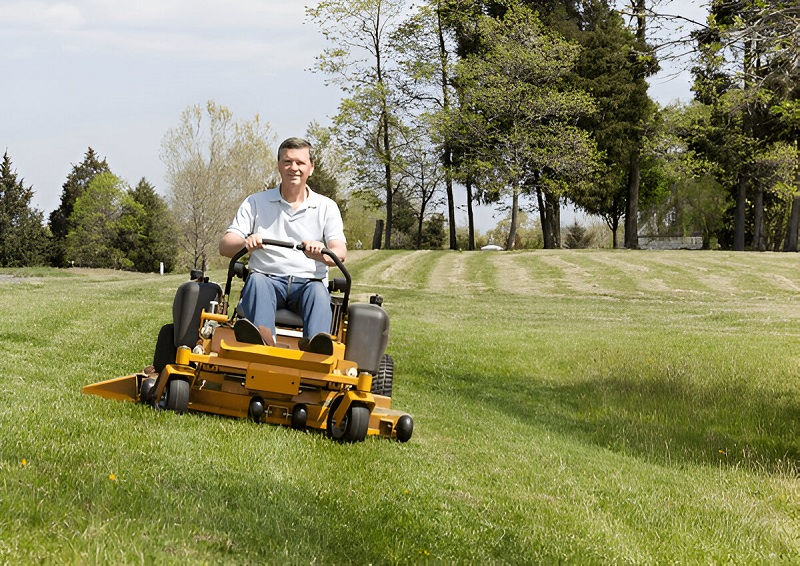Evaluating The Environmental Impact Of Zero Turn Ride-On Mowers
- Ashley Kinsela
- Jan 6, 2025
- 3 min read
Updated: Nov 3, 2025

Intriguingly enough, when we think of environmental impact, our minds wheel towards vast industries, mind-boggling traffic, or even our single-use plastic habits. But how often do we factor our verdant, well-manicured gardens into that equation? Particularly, have you thought about how your trusty ride-on mower might be contributing to the environmental toll? This post will shed light on zero turn ride-on mowers' eco-impact and potential alternatives.
Riding mowers, with their delightfully precise trims, are a favorite of homeowners sporting sizeable lawns. They are quick, efficient, and grant you a golf course-esque finish. However, is this convenience masquerading an ugly environmental footprint? It's time the gardener in you takes a curious look into what powers your lush corners.
Given the rising environmental consciousness, embracing sustainable gardening practices, such as using zero turn ride-on mowers, becomes necessary. How do they fare in terms of eco-friendliness? Is there any room for improvement? Let's dig in!
What Constitutes A Zero Turn Ride-On Mower?
Zero turn mowers are an innovative breed of lawn mowers. They boast a zero-degree turning radius, meaning they can make sharp turns and handle intricate landscaping effortlessly. Usual suspects behind their power engines are gasoline, diesel, or electric variants.
Why Is There A Buzz Around Their Environmental Impact?
Conventional gas or diesel-powered mowers belch out budget-and-eco-crippling fumes while maintaining your landscape. They contribute to air and noise pollution and demand significant maintenance and fuel. Meanwhile, electric zero turn mowers present a cleaner prospect in comparison.
Environmental Pros And Cons
Electric zero turn mowers whisper major pros: drastically reduced emissions, less noise pollution, and lower running costs. However, they are pressured by a few cons - their batteries may require frequent charging, and their initial investment can be steep. How these pros and cons balance out in your personal gardening equation is what ultimately counts.

The Green Spectrum: Comparing Alternatives
Alternatives to zero turn mowers include push mowers, robotic mowers, and reel mowers. While push mowers remain at a fair environmental standpoint, robotic mowers and reel mowers surprisingly lead the "green" front with their energy-efficient and emission-less features.
Reducing Eco-Impact: Sustainable Practices
To tame your ride-on mower's environmental impact, consider periodic maintenance to improve efficiency, opt for bio-fuels if applicable, or simply mow less often. Incorporating drought-resistant plants and natural pest controls can amplify your garden's green-score.
Legislative Support And Future Innovations
Legislation worldwide is triggering a shift towards green mowing equipment. Future innovations include solar-powered and automated models, signaling that a combo of technology and law could deliver exciting eco-solutions.
Driving the topic home, zero turn ride-on mowers, especially their electric versions, do have a part to play in the environmental lexicon. However, their eco-impact is a facet of wider variables, from maintenance practices to individual lawn conditions.
A greener trim isn't just about switching equipment; it weaves in a broader narrative of sustainable gardening. So maybe the question we ought to ask isn't just 'what' we're mowing with, but 'how' we're tending our lawns as a whole ecosystem. Ethical, eco-friendly gardening is more than a trend; it's an essential provider of solutions in the chronicles of climate change. This begs an intriguing perspective - Perhaps it's time the humble mower rode into the sustainability spotlight.
Conclusion :
As we continue to embrace more eco-conscious lifestyles, our gardens and the tools we use to maintain them cannot remain exempt from scrutiny. Zero turn ride-on mowers, particularly their electric variants, present a step in the right direction, offering reduced emissions, quieter operations, and lower long-term costs. However, their environmental footprint isn't solely determined by the mower itself, but by the broader practices and choices that surround it.
Switching to more sustainable options like push mowers, robotic mowers, or reel mowers can also contribute to reducing the ecological impact, while thoughtful practices such as reduced mowing frequency, proper maintenance, and eco-friendly landscaping can further enhance a lawn's green credentials. Additionally, innovations in technology, coupled with supportive legislation, will likely continue to push the boundaries of eco-friendly lawn care.
In the end, fostering a truly sustainable garden isn't just about selecting the "greenest" equipment, but about adopting a holistic approach that values the environment at every step. So, the next time you're out there mowing your lawn, ask yourself not just what you're using, but how you're managing your garden as part of the greater ecological system. It's not just a lawn you're tending, but a piece of the planet that can benefit from a greener, more responsible approach to care.



Comments